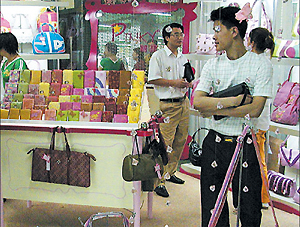
The Chinese mainland and the Hong Kong Special Administrative Region (SAR) are negotiating the extension of zero-tariff treatment for more Hong Kong-made goods. The talks are a move to implement the next phase of the Closer Economic Partnership Arrangement (CEPA) between the two areas.
Parties will also negotiate the further opening-up of the mainland's services trade market to Hong Kong investors and the possibility of opening up new sectors, sources with the Commerce, Industry and Technology Bureau of the SAR government told China Daily.
The negotiations come as the grace period of China's accession to the World Trade Organization (WTO) is due in November, which means that restrictions for foreign investments on most sectors will be lifted and import duties will continue to be lessened.
It is against this backdrop that Hong Kong is seeking new benefits from the CEPA.
A team headed by the bureau secretary John Tsang Chun-wah met officials from the Beijing-based Ministry of Commerce (MOFCOM) last week to discuss the matter, the bureau said.
A total of 205 products, including food, beverages, electronic products and apparel as well as metal, plastic, chemical and optical products, are subject to ministry scrutiny to be considered for adding to the free-trade list, the bureau says.
"The result of the negotiation will be released this year," sources said. "Non-tariff treatment will be extended to an expanded list of goods beginning from January 2005."
Under the CEPA, which was implemented this year, 374 products made in Hong Kong and Macao are now subject to zero import duties.
Beginning from January 2006, all local products will enjoy free-trade treatment.
Hong Kong industries, particularly, are asking the central government to extend zero-tariff treatment to the food-processing sector, which is the region's fourth largest sector.
From January to May, a total of US$42.3 million worth of Hong Kong goods entered the mainland without duties, said Chen Xing, deputy director of the department of Taiwan, Hong Kong and Macao Affairs of the MOFCOM.
"Judging from the figures, the CEPA is conducive to strengthening the trade and economic ties between the mainland and Hong Kong and Macao," said Hua Xiaohong, a leading scholar of regional economy at the University of International Business and Economics in Beijing.
A number of Hong Kong and Macao investors have increased their presence on the mainland markets thanks to the investment facilitation measures included in the agreement, which lowered thresholds and lifted market restrictions for Hong Kong and Macao investors ahead of China's World Trade Organization commitments.
Preferential policies are allowed in 18 sectors such as exhibitions, accounting, legal services, telecommunications and banking.
For example, under the CEPA, Hong Kong and Macao advertising agencies have been allowed to set up wholly owned agencies on the mainland from January 1, 2004.
That is almost two years earlier than other overseas investors.
It is also reported that Hong Kong-based Star TV will set up a wholly-owned advertising company in Shanghai, the first such agency.
In addition, business people in Hong Kong and Macao can now seek bigger participation in the mainland's service sectors by qualified service provider schemes.
This also creates more jobs for Hong Kong people, Hua said.
Statistics show that in the southern city of Guangzhou alone, more than 120 business professionals from Hong Kong and Macao commenced doing business there from January to May. The number is expected to increase quickly, local officials said.
However, Hua also pointed out the pact has not been fully implemented, as the six months is only a buffer period for the two sides to familiarize themselves with the CEPA process.
For example, SMEs, the pact's target beneficiaries, have not flocked into the mainland as expected, Hua said.
She said she believed the situation would be improved when the next phase of the CEPA is carried out and after the SMEs become acquainted with the mainland market and its operations.
"Business spaces for Hong Kong and Macao investors are big," she said.
"The CEPA's benefit for Hong Kong and Macao mainly lies in giving them greater access to the mainland's service sectors instead of simple goods imports and exports," Hua said.
(China Daily June 28, 2004)
|

